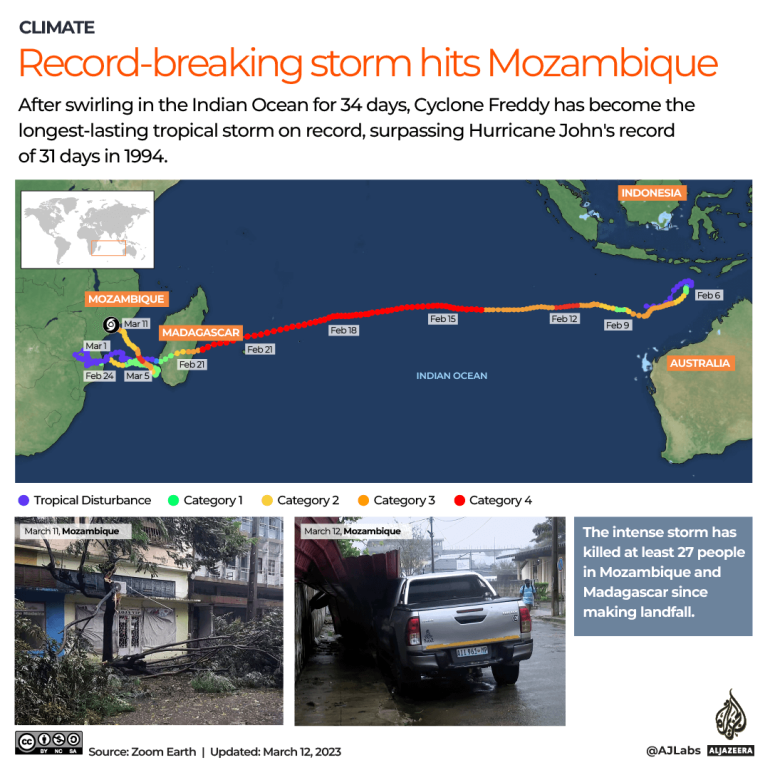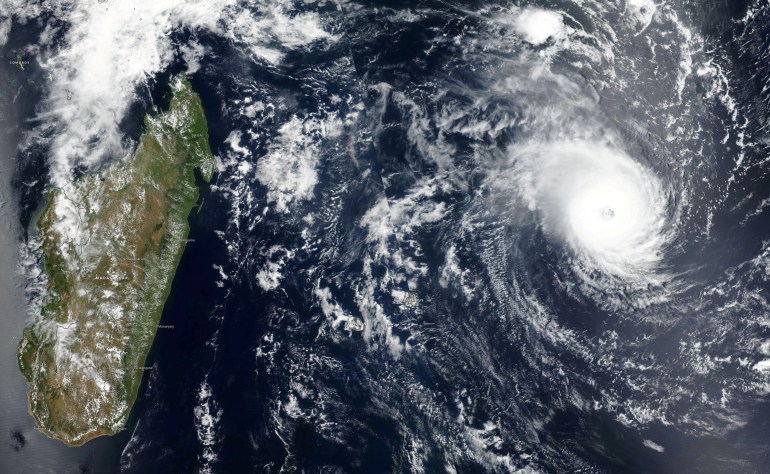After swirling in the southern Indian Ocean for 34 days, Freddy is on track to become the longest-lasting cyclone on record.
Thank you for reading this post, don't forget to subscribe!Hundreds of people have been displaced as cyclone Freddy hit Mozambique for a second time in two weeks, killing at least one person and prompting a lockdown in one port town, according to a resident and local media.
Freddy, on track to become the longest-lasting cyclone on record, started sweeping onshore by 10pm local time (20:00 GMT) on Saturday, satellite data showed, after hours of battering the southern African coast with rain.
It was the second time the cyclone has struck Mozambique since it was named after being spotted near Indonesia on February 6. At least 27 people died the last time the storm pummelled the region.

The United Nations Office for the Coordination of Humanitarian Affairs (OCHA) said Freddy made landfall in Mozambique in the Quelimane district of the central Zambezia province as a tropical cyclone.
It said there was a high risk of flooding in Zambezia and neighbouring Nampula province. Water levels at several river basins were already above the alert level, it added.
State broadcaster TVM said one person died in Quelimane when his house collapsed and that the power utility had switched off the electricity completely as a precaution. All flights were suspended, it added.
Communications and electricity supply in the storm area have been cut so the extent of the damage and number of casualties were not clear.
State TV reported that hundreds were displaced across the storm’s path. More than 650 houses were destroyed in Marromeu district, it said, while in Sofala province more than 3,000 people were affected by flooding.
Vania Massingue, a resident of Quelimane, said the port town was locked down ahead of the storm’s landfall.
“The town is a no-go zone; no shops or businesses open. Everything is closed. We’re locked up,” she told the Reuters news agency. “I can see some houses with roofs torn apart, broken windows and the streets flooded. It’s really scary.”
According to the World Meteorological Organization, Freddy, which has swirled in the southern Indian Ocean for some 34 days, is set to become the longest-lasting tropical cyclone on record. The previous record was held by a 31-day hurricane in 1994.

After forming off northwestern Australia in the first week of February, Freddy crossed the entire southern Indian Ocean and battered Madagascar from February 21 before reaching Mozambique on February 24.
More than 171,000 people were affected when the cyclone swept through southern Mozambique last month, bringing heavy rains and floods that damaged crops and destroyed houses. OCHA has put its death toll at 27 so far — 10 in Mozambique and 17 in Madagascar.
Freddy then headed back towards Madagascar before moving once more towards Mozambique, in what meteorologists have described as a “rare” loop trajectory.
More than half a million people are at risk in Mozambique this time, notably in Zambezia, Tete, Sofala and Nampula provinces.
Guy Taylor, a spokesperson for UNICEF, told the AFP news agency that the cyclone had caused “substantial flooding” ahead of its landfall.
“We saw people with water in their houses, wading through knee-deep water. And that’s just with this initial bit of rain,” he said from Quelimane.
Taylor noted concern that renewed flooding could exacerbate a cholera outbreak that has killed at least 38 people and infected almost 8,000 since September.
The disease, which causes diarrhoea and vomiting, is contracted from a bacterium generally transmitted through contaminated food or water.
Freddy, which is also expected to hit northeastern Zimbabwe, southeast Zambia and Malawi, has set a record for the highest accumulated cyclone energy — a measure of the storm’s strength over time — of any southern hemisphere storm in history, according to the United States National Oceanic and Atmospheric Administration.
Around the world, climate change is making hurricanes wetter, windier and stronger, scientists say.
Oceans absorb much of the heat from greenhouse gas emissions and when warm seawater evaporates, its heat energy is transferred to the atmosphere, fuelling more destructive storms.
